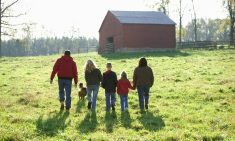Two questions keep many farm families awake at night. Can your next generation be reasonably expected to preserve and grow the farm’s net value? Could you do it, facing what they face?
As I wrote some four years ago in this space, “Fortunately, science can help.”
Every issue of Country Guide deals with this issue. We look at the nuts and bolts. How do you actually structure the farm to thrive after you’re gone?
Read Also

Part 4: Financial disagreements between farm siblings
A six-part series that looks at the challenges sibling conflict can have on the farm business and family business relationships.
We look at how to get there too. Agriculture has learned so much about how farm families can come together and achieve harmony on a plan for going forward.
We don’t say it will be easy. But then, the evidence is clear that if a farm doesn’t tackle transition with a sense of calm deliberation, soon enough nothing else will be easy either.
Even so, as we head into an incredibly important winter for the future of Canadian agriculture, I wanted to go back to a column I originally wrote in 2018.
It’s because we all need reminding from time to time of the fundamental importance of character.
My earlier column was based on work at University College London, where psychologists looked at successful people across a wide range of business sectors and they identified six ingredients for what they call their High Potential Trait inventory.
The first trait on their list isn’t IQ or independence or anything of the sort. It’s conscientiousness. If you say you will do a thing, do you follow through?
Even in school environments, where you’d expect intelligence to be the dominant factor, conscientiousness is the best predictor of success.
Second is curiosity. Is it in your nature to wonder how a thing works? Do you find yourself wondering whether a thing will always turn out the way it just did?
Then comes courage. If you know a thing is right for your farm, will you persevere?
The trait that psychologists call adjustment is essential too. When the pressure is on, do you find ways to keep your performance up? And how quick are you to spot and learn from mistakes?
Ambiguity tolerance, meanwhile, means you don’t decide until you’ve heard all sides. You don’t go into a discussion — like a family meeting — with your mind already made up.
And last comes competitiveness, which doesn’t always win you friends but does drive you to do better.
So there you have it. Are you conscientious, curious, and courageous? Do you adjust well, do you keep an open mind, and are you competitive for your farm?
There’s another question, though. Who should have to take this test — the next gen or the parents?
The easy answer is both, but we all know the pressure is on for the next generation to prove that they’re the right people at the right time.
My guess is, most parents will emerge from this with a new sense of confidence in the farm. It’s a great way to head into 2023.
Are we getting it right? Let me know at [email protected].
















